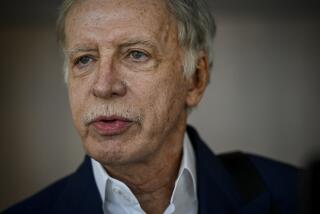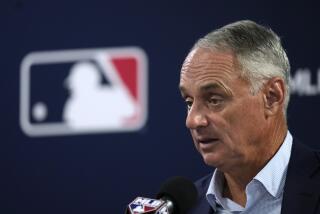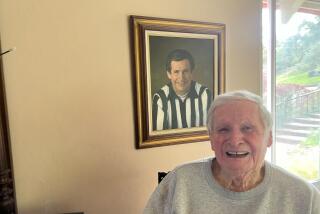Tagliabue Can Go in Peace
Two weeks after his personal Super Bowl moment -- pulling the NFL back from the brink of a labor meltdown -- Paul Tagliabue has decided to walk away from the game.
Tagliabue, the league’s commissioner for more than 16 years, announced Monday he plans to retire in July. It marks the end of an incredibly successful reign during which franchise values quintupled, more than three-quarters of the teams got new stadiums and television deals skyrocketed.
“As difficult as this decision is, I also know it’s the right decision, and I have no doubt about that,” said Tagliabue, 65, who succeeded the late Pete Rozelle in 1989. “And when I say ‘right,’ I mean right for the league.”
The decision was not entirely a surprise. Tagliabue said last spring that he intended to stay at least until the television and labor contracts were done. In a rare unanimous vote, owners agreed to extend his contract so he could do that. And two weeks ago, after the most arduous labor negotiations since the salary cap was put in place in 1993, the owners voted, 30-2, in favor of a new collective bargaining agreement and revenue-sharing plan. Some league insiders called it Tagliabue’s finest hour as commissioner.
Tagliabue said the decision to retire was made over the last 10 days. On Monday morning, he broke the news to Dan Rooney, owner of the Pittsburgh Steelers. He then informed the other owners by way of phone calls and e-mails. He said moving forward quickly is vital for the league, although he intends to stay on as a senior executive and consultant through 2008.
The process of picking a new commissioner, one who must be voted into office by the owners, will begin next week at the league meetings in Orlando.
“Uncertainty and speculation runs the risk of paralysis in a good organization and in an organization which is national and international such as our league,” Tagliabue said.
The leading candidates to replace Tagliabue are league executives Roger Goodell and Eric Grubman, and Rich McKay, president of the Atlanta Falcons. But owners also are expected to look outside the league for viable candidates. Similar to the way an emphasis has been placed on interviewing minority candidates for coaching and front-office jobs, Tagliabue said, the league’s diversity committee will play a role in nominating his successor.
“Dan Rooney and I have already talked about that, and that will be one of the key things as we go forward with this search,” he said.
The job is unique in that the commissioner heads the league but has 32 different bosses, the individual team owners. Tagliabue, a former NFL attorney, flourished in the role.
Since Tagliabue took over for Rozelle, the NFL is the only major professional sports league without a work stoppage by players. The two strikes near the end of Rozelle’s 30-year career as commissioner made his last decade his worst. Rozelle was almost helpless to stop the 1982 and ’87 strikes because he was subordinate to owner-run committees in several key areas, including labor. When he took over as commissioner, Tagliabue convinced owners to give him the power Rozelle lacked.
“I was always encouraged by one of his personal philosophies that he shared with the ownership on several occasions. ‘If it isn’t broke,’ Paul would say, ‘let’s fix it anyway,’ ” said Jerry Jones, owner of the Dallas Cowboys. “That played well with me. It inspired me to think outside the box.”
Few could have imagined how the value of franchises and broadcast contracts would shoot upward during the Tagliabue era. When he took the job, the TV deal paid an average of $468 million a year; the latest deal averages $3.7 billion a year.
The Miami Dolphins were worth an estimated $205 million in 1991. The latest valuation of the Washington Redskins has them at $1.3 billion.
The league expanded from 28 to 32 teams under Tagliabue, and 26 of those are now playing in new or significantly renovated stadiums. He also oversaw realignment, the instant-replay challenge system, the creation of NFL Europe, and year-round random steroid testing.
“Under Paul’s leadership, the National Football League has truly broken every record,” said Steve Tisch, chairman of the New York Giants. “The commissioner led the league with a vision, with passion and with a ferocious love of the game of football.... The next commissioner will have very big cleats to fill.”
Also during Tagliabue’s tenure, the Raiders and Rams relocated from Los Angeles, leaving the nation’s second-largest market without a professional football team since 1995. In a conference call Monday, he said that situation is among his biggest regrets.
“I think I’ve said before that if we had the benefit of hindsight, we would have made certain that either the Rams or the Raiders stayed in L.A. in the mid-’90s,” Tagliabue said. “I thought that we were taking all of the steps that we needed to take when we passed that resolution in providing for the stadium in Hollywood Park, and it turned out not to be operative. I guess if you could go back and relive a month, that might be the month where you might do something differently.”
He identified L.A. as a “key priority” and said with the completion of the TV and labor deals that “getting a team or teams back into the Los Angeles area rises right to the top of the list.”
In its latest attempt to re-enter the L.A. market, the league is evaluating two stadium concepts, one at the Coliseum and the other in Anaheim. Neither group will present at next week’s meetings.
“The league has made it very clear to us that everything is on course,” said L.A. City Councilman Bernard C. Parks, a supporter of the Coliseum proposal.
Charlie Isgar, a Coliseum executive who has worked with the league throughout Tagliabue’s tenure, said the commissioner never had a desirable stadium situation in L.A. on his watch.
“Once the Raiders and Rams left, he set a tough standard for the L.A. marketplace,” Isgar said. “He did that to ensure that the next NFL club in L.A. had a world-class facility, a competitive team on the field, and an owner who would shine in the media capital of the country.”
In doing so, Isgar said, Tagliabue headed off several “patch-gap” proposals.
“He wasn’t going to do it,” he said, “unless they could do it right.”
*
(BEGIN TEXT OF INFOBOX)
NFL commissioners
Top executives of the NFL (*denotes title of league president):
Years: 1920
Commissioner: JIM THORPE *
Comment: Made president to be face of new American Professional Football Assn.
---
Years: 1921-39
Commissioner: JOE CARR *
Comment: Banned collegians; introduced standard player contracts; kept league running through Depression, became NFL.
---
Years: 1939-41
Commissioner: CARL STOCK *
Comment: First televised game in 1939; first championship broadcast on network radio in 1940.
---
Years: 1941-46
Commissioner: ELMER LAYDEN
Comment: Held league together during war years, using lesser talent because of draft, and temporarily merging franchises.
---
Years: 1946-59
Commissioner: BERT BELL
Comment: Started local TV blackouts; recognized formation of players’ association; first national telecast, 1958 title game.
---
Years: 1959-60
Commissioner: AUSTIN GUNSEL
Comment: Interim commissioner in wake of Bell’s death; lost vote to Rozelle in 1960 election.
---
Years: 1960-89
Commissioner: PETE ROZELLE
Comment: Started league-wide network television package, Super Bowl, Monday night games; led NFL-AFL merger.
---
Years: 1989-2006
Commissioner: PAUL TAGLIABUE
Comment: Added four franchises to league, realigned in 2002, spurred stadium boom. Leaves with new six-year labor deal.
*
Growth industry
The NFL during Paul Tagliabue’s tenure as commissioner from 1989-2006:
LABOR PEACE
A deal with players was struck in 1993, extended five times, and now is established through at least 2011. The salary cap in 1994: $34.6 million; projected cap in 2007: $109 million, up 215%.
EXPANSION
The league expanded from 28 to 32 teams; the last previous expansion was in 1976.
REVENUE GROWTH
Leaguewide revenue grew from $970 million to $5.8 billion.
Per-team TV revenue: from $16.7 million to $87.5 million in 2005. TV deal in 1987-1989 averaged $468 million a year. Latest deals average $3.7 billion a year.
Three NFL teams -- Washington, Dallas and New England -- now valued at more than $1 billion, according to Forbes magazine.
STADIUM DEVELOPMENT
Twenty-six new or significantly rebuilt stadiums, led by public-private partnerships.
PLAYER PROGRAMS
The NFL has the toughest drug policy among major U.S. pro leagues: year-round random steroid testing.
POPULARITY
Football continues to be the most popular sport, ahead of second-place baseball, according to a Harris poll in 2005. A sampling of recent Harris polls:
2005
Pro Football...33%
Baseball...14%
2004
Pro Football...30%
Baseball...15%
1998
Pro Football...26%
Baseball...18%
1993
Pro Football...24%
Baseball...18%
1985
Pro Football...24%
Baseball...23%
Source: NFL
More to Read
Go beyond the scoreboard
Get the latest on L.A.'s teams in the daily Sports Report newsletter.
You may occasionally receive promotional content from the Los Angeles Times.











